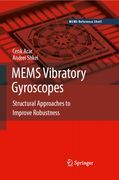
MEMS vibratory gyroscopes: structural approaches to improve robustness
Acar, C.
Shkel, A.M.
MEMS Vibratory Gyroscopes provides a solid foundation in the theory and fundamental operational principles of micromachined vibratory rate gyroscopes, and introduces structural designs that provide inherent robustness against structural and environmental variations. In the first part, the dynamics of the vibratory gyroscope sensing element is developed, common micro-fabrication processes and methods commonly used in inertial sensor production are summarized, design of mechanical structures for both linear and torsional gyroscopes are presented, and electrical actuation and detection methods are discussed along with details on experimental characterization of MEMS gyroscopes. In the second part, design concepts that improve robustness of the micromachined sensing element are introduced, supported by constructive computational examples and experimental results illustrating the material. Provides a unique balance between theory and practical design issues Presents comprehensive and detailed information outlining the mathematical models of the mechanical structure and system-level sensor design Provides a solid background on mechanical and electrical design, fabrication, packaging, testing and charactrization INDICE: Introduction.- Fundamentals of micromachined gyroscopes.- Fabrication technologies.- Mechanical design of MEMS gyroscopes.- Electrical design ofMEMS gyroscopes.- MEMS gyroscope testing and characterization.- Structural approaches to improve robustness.- Multiple-DOF design concept.- Torsional multiple-DOF systems.- Distributed interconnected oscillators.- Conclusion.
- ISBN: 978-0-387-09535-6
- Editorial: Springer
- Encuadernacion: Cartoné
- Páginas: 250
- Fecha Publicación: 01/09/2008
- Nº Volúmenes: 1
- Idioma: Inglés
